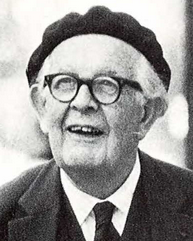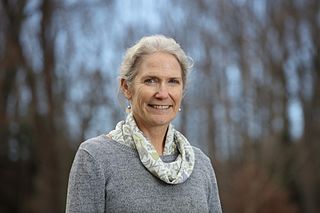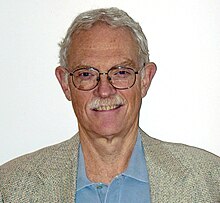
Jean William Fritz Piaget was a Swiss psychologist known for his work on child development. Piaget's theory of cognitive development and epistemological view are together called "genetic epistemology".

Albert Bandura was a Canadian-American psychologist. He was a professor of social science in psychology at Stanford University.
Social cognition is a topic within psychology that focuses on how people process, store, and apply information about other people and social situations. It focuses on the role that cognitive processes play in social interactions.
Michael Tomasello is an American developmental and comparative psychologist, as well as a linguist. He is professor of psychology at Duke University.
John H. Flavell is an American developmental psychologist specializing in children's cognitive development.
Alan M. Leslie is a Scottish psychologist and Professor of Psychology and Cognitive science at Rutgers University, where he directs the Cognitive Development Laboratory (CDL) and is co-director of the Rutgers University Center for Cognitive Science (RUCCS) along with Ernest Lepore.
Domain-general learning theories of development suggest that humans are born with mechanisms in the brain that exist to support and guide learning on a broad level, regardless of the type of information being learned. Domain-general learning theories also recognize that although learning different types of new information may be processed in the same way and in the same areas of the brain, different domains also function interdependently. Because these generalized domains work together, skills developed from one learned activity may translate into benefits with skills not yet learned. Another facet of domain-general learning theories is that knowledge within domains is cumulative, and builds under these domains over time to contribute to our greater knowledge structure. Psychologists whose theories align with domain-general framework include developmental psychologist Jean Piaget, who theorized that people develop a global knowledge structure which contains cohesive, whole knowledge internalized from experience, and psychologist Charles Spearman, whose work led to a theory on the existence of a single factor accounting for all general cognitive ability.
Neurodevelopmental framework for learning, like all frameworks, is an organizing structure through which learners and learning can be understood. Intelligence theories and neuropsychology inform many of them. The framework described below is a neurodevelopmental framework for learning. The neurodevelopmental framework was developed by the All Kinds of Minds Institute in collaboration with Dr. Mel Levine and the University of North Carolina's Clinical Center for the Study of Development and Learning. It is similar to other neuropsychological frameworks, including Alexander Luria's cultural-historical psychology and psychological activity theory, but also draws from disciplines such as speech-language pathology, occupational therapy, and physical therapy. It also shares components with other frameworks, some of which are listed below. However, it does not include a general intelligence factor, since the framework is used to describe learners in terms of profiles of strengths and weaknesses, as opposed to using labels, diagnoses, or broad ability levels. This framework was also developed to link with academic skills, such as reading and writing. Implications for education are discussed below as well as the connections to and compatibilities with several major educational policy issues.
Susan E. Carey is an American psychologist who is a Professor of Psychology at Harvard University. She studies language acquisition, children's development of concepts, conceptual changes over time, and the importance of executive functions. She has conducted experiments on infants, toddlers, adults, and non-human primates. Her books include Conceptual Change in Childhood (1985) and The Origin of Concepts (2009).

Nora S. Newcombe is the Laura H. Carnell Professor of Psychology and the James H. Glackin Distinguished Faculty Fellow at Temple University. She is a Canadian-American researcher in cognitive development, cognitive psychology and cognitive science, and expert on the development of spatial thinking and reasoning and episodic memory. She was the principal investigator of the Spatial Intelligence and Learning Center (2006-2018), one of six Science of Learning Centers funded by the National Science Foundation.

Susan Goldin-Meadow is the Beardsley Ruml Distinguished Service Professor in the Departments of Psychology, Comparative Human Development, the college, and the Committee on Education at the University of Chicago. She is the principal investigator of a 10-year program project grant, funded by the National Institute of Child Health and Human Development, designed to explore the impact of environmental and biological variation on language growth. She is also a co-PI of the Spatial Intelligence and Learning Center (SILC), one of six Science of Learning Centers funded by the National Science Foundation to explore learning in an interdisciplinary framework with an eye toward theory and application. She is the founding editor of Language Learning and Development, the official journal of the Society for Language Development. She was President of the International Society for Gesture Studies from 2007–2012.

Susan A. Gelman is currently Heinz Werner Distinguished University Professor of psychology and linguistics and the director of the Conceptual Development Laboratory at the University of Michigan. Gelman studies language and concept development in young children. Gelman subscribes to the domain specificity view of cognition, which asserts that the mind is composed of specialized modules supervising specific functions in the human and other animals. Her book The Essential Child is an influential work on cognitive development.
Amanda Woodward is Dean of the Division of the Social Sciences and the William S. Gray Professor of Psychology at the University of Chicago. Her research investigates infant social cognition and early language development including the understanding of goal-directed actions, agency, theory of mind, and learning from social partners. She is a fellow of the American Academy of Arts and Sciences.
Jean Matter Mandler is Distinguished Research Professor of Cognitive Science at the University of California, San Diego and visiting professor at University College London.
Katherine Nelson was an American developmental psychologist, and professor.
Eleanor Emmons Maccoby was an American psychologist who was most recognized for her research and scholarly contributions to the fields of gender studies and developmental psychology. Throughout her career she studied sex differences, gender development, gender differentiation, parent-child relations, child development, and social development from the child perspective.
Paul L. Harris is a British psychologist and academic specialising in child development. He is a professor at Harvard Graduate School of Education in Cambridge, Massachusetts.

The Department of Psychology at Harvard University is an academic department in Cambridge, Massachusetts, United States, that is part of the Harvard Faculty of Arts and Sciences. The department offers bachelor's, master's and doctorate degrees in psychology. Current research at the department focuses on clinical, cognitive, developmental, and social psychology. Notable psychologists that have been affiliated with the department include William James, B. F. Skinner, Gordon Allport, Jerome Bruner, George Miller, and Henry Murray, among others. The department ranks as one of the top psychology departments in the United States and the world.

Dr. Angeline Stoll Lillard is a professor of psychology at the University of Virginia, where she directs the Early Development Laboratory, one of four child development laboratories in the psychology department at the university. Lillard is an internationally recognized expert in Montessori education and the author of Montessori: The Science Behind the Genius, which is in its third edition, has been translated into several languages, and was awarded the Cognitive Development Society Book Award in 2006.
Patricia Hackney Miller is a developmental psychologist known for her research on cognitive development during early childhood. She holds the position of Professor of Psychology at San Francisco State University.







